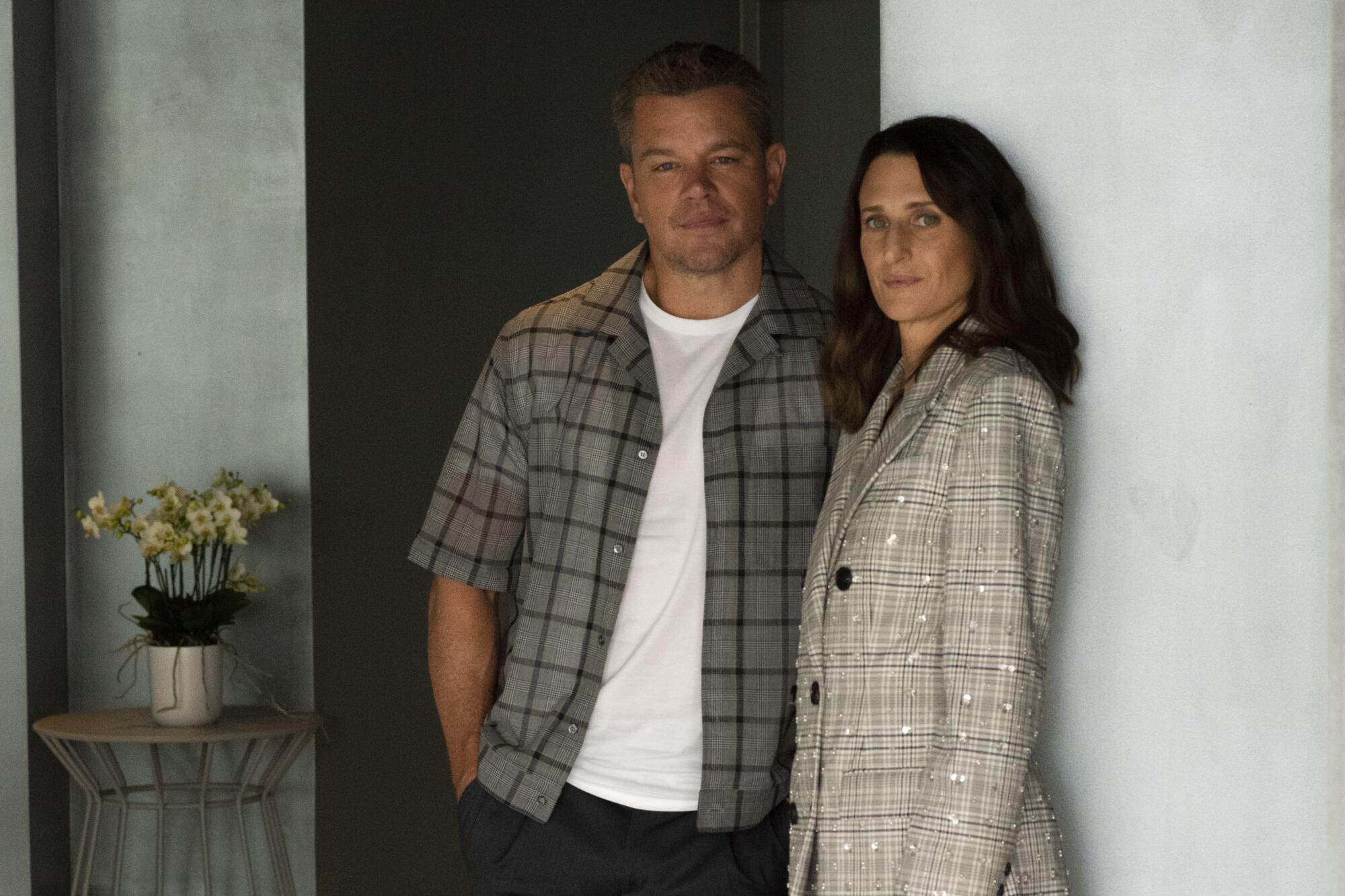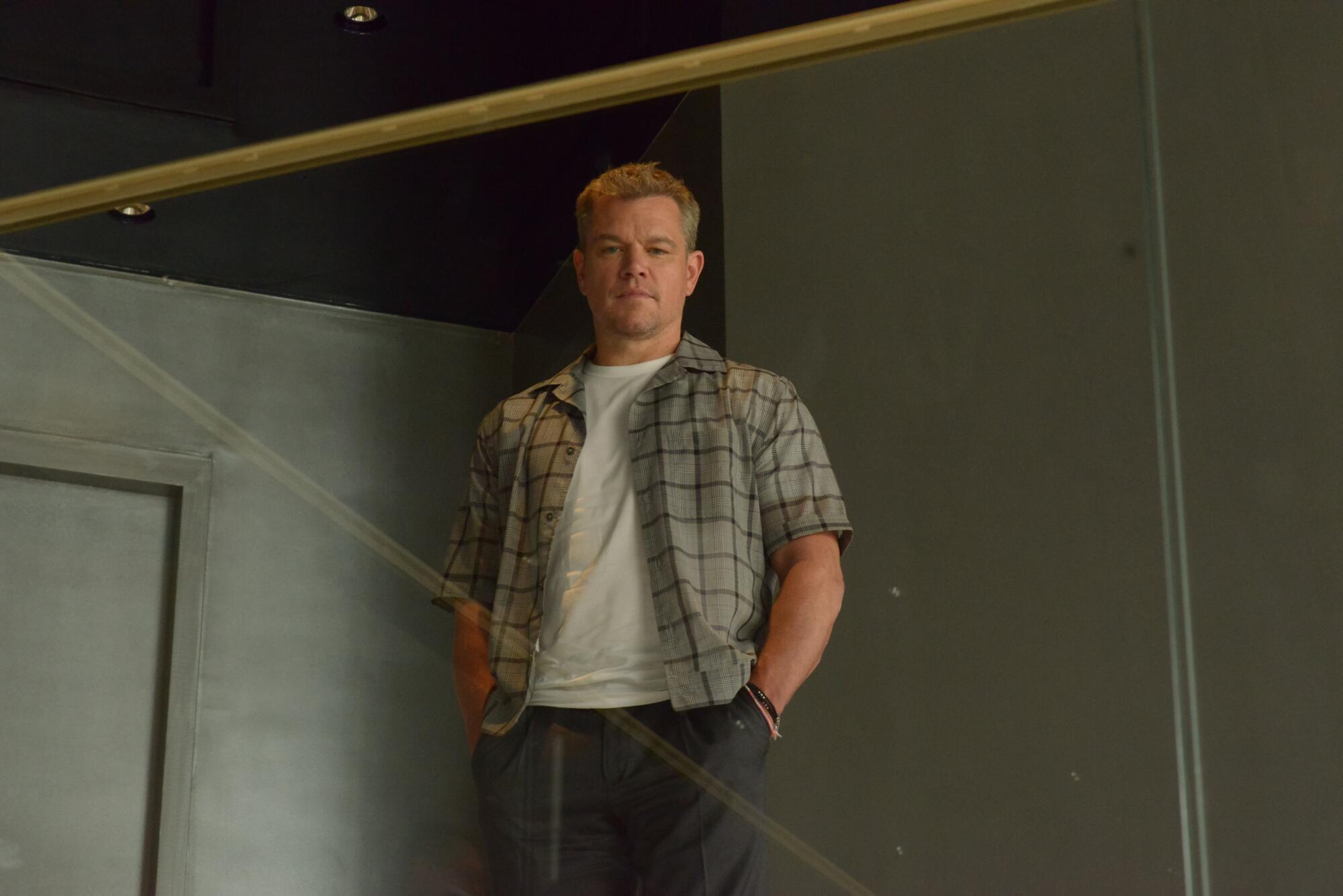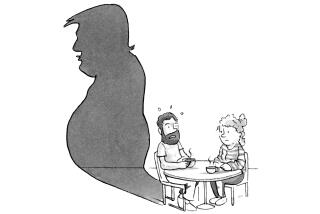
- Share via
For all the time he has spent traveling the globe making and promoting movies throughout his career, Matt Damon is sad to report that his linguistic abilities are sorely limited.
“I’ve spent so much time in Italy, in Hungary, in France, in Jordan, and I’ve got nothing to show for any of it,” Damon said recently over Zoom from his home in Los Angeles. “I speak some Spanish but that’s about it. Unfortunately, when you’re in production you’re just lighting money on fire, and they don’t have time for you to sit there and learn a language. It ain’t about your experience and your growth.”
When it came to his latest film — the dramatic thriller “Stillwater,” in theaters Friday — that proved a strange kind of asset. Originally slated for release in November 2020 and delayed due to the pandemic, the film is in part an exploration of the stereotype of the “ugly American,” throwing elbows on the world’s stage, blind to other points of view. “My ignorance definitely helped my performance,” Damon said.
Directed by Tom McCarthy (“Spotlight”), “Stillwater” stars Damon as an Oklahoma roughneck named Bill Baker who travels to the French port city of Marseille to attempt to free his estranged daughter (Abigail Breslin) from prison for a murder she insists she didn’t commit. Struggling to navigate a culture that is completely alien to him, Baker enlists the help of a sympathetic local single mother named Virginie (Camille Cottin), and the two form an unlikely bond, even as Baker goes outside the law in pursuit of what he believes to be justice.
At first glance, “Stillwater” appears to have the trappings of an action thriller, a la Liam Neeson’s “Taken,” refracted through a fictional twist on the real-life saga of Amanda Knox. But, collaborating with French screenwriters Thomas Bidegain and Noé DeBré, McCarthy sought to make something deeper, mining themes of intolerance, forgiveness and morality that he hope will resonate with audiences after the turbulence of the Trump era.
Aiming to deliver his take on a Mediterranean noir, McCarthy started working on the film a decade ago but feeling dissatisfied with the script, put it away in a drawer. “I really didn’t have any intention of going back to it,” said McCarthy, who went on to earn Oscars for best picture and original screenplay for 2015’s “Spotlight,” along with a directing nod. “While the setup was good, it just wasn’t fully realized.”
But the idea for “Stillwater” stuck in the back of McCarthy‘s mind and six years after setting it aside he brought it to Bidegain and DéBr´é, who collaborated on films such as Jacques Audiard’s 2015 crime drama “Dheepan.” Over the next 18 months, the three rewrote the script, deepening the characters and pushing the story toward a cross-cultural fusion of American and French cinematic styles.
“The film upsets expectations, and I think that’s the beauty of this great American screenwriter and these two great French screenwriters coming together,” Damon said. “You think it’s going to be: ‘Give me back my daughter! I have a very particular set of skills.’ And it’s like, no, Bill Baker doesn’t have any of those skills. But he loves his kid and he’s doing the best he can in a world that he doesn’t quite understand at all.”
At the time, the [Trump] administration was taking America out of international things. It was a weird time for us in the relationship with America.
— Thomas Bidegain, screenwriter
Even as McCarthy, Bidegain and DéBré reworked the script, perceptions of Americans abroad were rapidly changing in the wake of the election of Donald Trump. It was inevitable that those shifting political currents made their way into the script. “It’s not an overtly political movie but there is certainly politics in the DNA,” McCarthy said. “Writing this in 2016 and 2017, how could there not be?”
“Tom was really eager to talk about the moral authority of America,” Bidegain said. “At the time, the new administration was taking America out of international things. It was a weird time for us in the relationship with America.”
Along with politics, the three discussed their mutual love of long-form true-crime podcasts like “Serial” and “S-Town.” “We talked about how these podcasts moved beyond the crime and into the world of character,” McCarthy said. “We thought, let’s start reaching for that cinematically. Let’s try to sort of mirror that in our writing and ultimately, in our filmmaking. It really gave us a sort of guiding principle.”
To play the role of Virginie, McCarthy cast Cottin, who is well known in her native France but has only recently earned wider recognition in Hollywood due to the international success of the French comedy series “Call My Agent!” on Netflix.
“Tom knew nothing about me,” said Cottin, who will be seen later this year in Ridley Scott’s crime drama “House of Gucci.” “It was nice because it was just the work and the character as I proposed it and as we built it together, that made his choice.”
Shooting on location in Marseille with an almost entirely French crew, McCarthy steered away from the gauzy, picture-postcard depiction one might expect in an American film. Rather than romanticize the port city, he tried to capture both its beauty and vibrancy as well as its grittier side, highlighting tensions over issues of race and immigration that in many ways mirror those in American society.
”The way Tom filmed Marseille, it’s so true to what the city really is,” Cottin said. “Marseille is one of the most violent cities in France, and even if it’s not something that is fully depicted, it is there and it is talked about. I was quite struck by the veracity of it.”
In crafting Damon’s character as well, the goal was to capture nuance rather than cliche. A proud gun-owning oil worker from middle America, Baker is almost a caricature in the eyes of those he meets in Marseille. (Asked at one point if he voted for Trump, Baker says no but only because he had felonies that made him ineligible to vote.) But as the film progresses those preconceptions start to break down.

It didn’t mean we were ever going to agree politically about anything. But they gave us incredible access to their lives, and that’s what we needed to leave with, a real understanding of this guy.
— Matt Damon
“The kind of work we’ve done in our films is to take people that are usually mocked or that some people would look down to and then make them the heroes,” said Bidegain. “If you take a guy like Bill and he changes five degrees in the right direction, that gives you faith in the entire humanity.”
While Damon’s liberal political leanings are well known, he tried to create an empathetic, three-dimensional portrait of Baker, informed by real-life roughnecks he and McCarthy got to know during a research trip to Oklahoma before shooting.
“They were naturally and completely justifiably wary at first, like, ‘What’s going on here? Are you going to have a go at us?’“ Damon said. “But once they saw what the movie was, they wanted me to get it right. It didn’t mean we were ever going to agree politically about anything. But they gave us incredible access to their lives, and that’s what we needed to leave with, a real understanding of this guy.”
As deep as the divisions in American society are — and as morally murky as “Stillwater” may be in the end — Damon said his experience in Oklahoma gathering details to build his character left him feeling optimistic.
“I always leave those research trips with the exact same takeaway, which is that the things that bind us are so much greater than the things that divide us,” Damon said. “You leave really pissed off at politicians for stoking those divides. Yeah, we have political differences but the guys we hung out with were really good people with beautiful families. The idea that we’re so different that we couldn’t possibly sit down and have a cup of coffee together is crazy.”
More to Read
Only good movies
Get the Indie Focus newsletter, Mark Olsen's weekly guide to the world of cinema.
You may occasionally receive promotional content from the Los Angeles Times.









